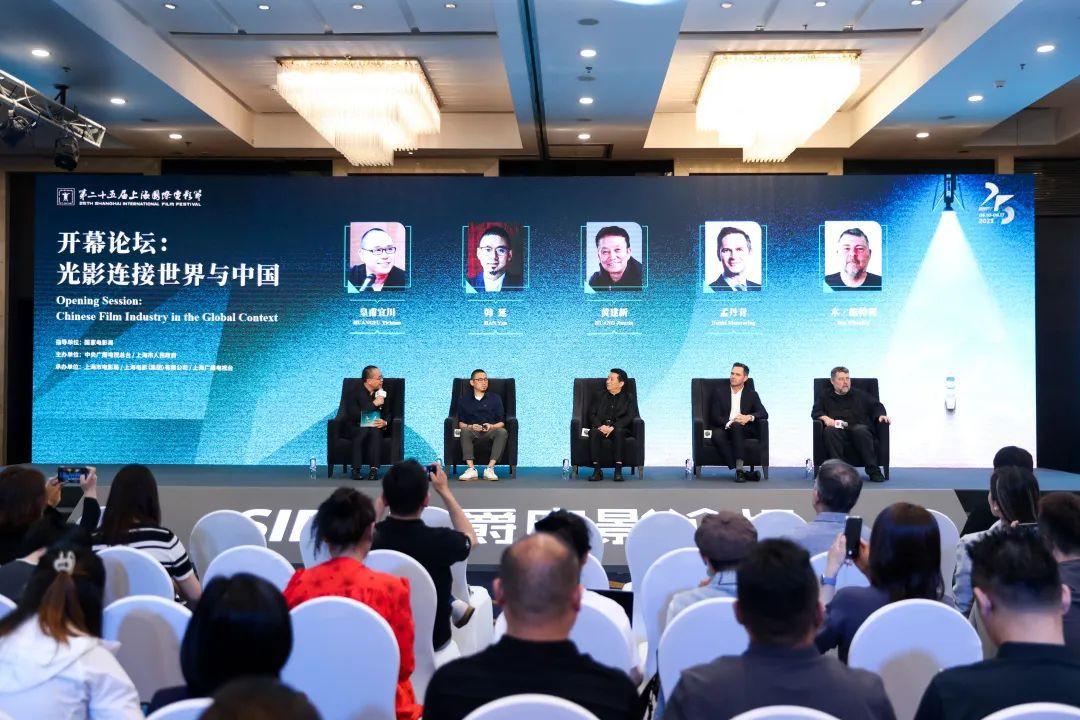
During the opening session of the SIFForum section held on Saturday for the Shanghai International Film Festival (SIFF), which was themed "Chinese Film Industry in the Global Context," participants noted that

Filmmakers join a discussion panel at a SIFForum session during the Shanghai International Film Festival (SIFF), on June 10, 2023. [Photo courtesy of SIFF Organizing Committee]
In filmmaker Huang Jianxin's view, it was a natural process for cinema to connect the world with China, as film should inherently play an important role in international cooperation and exchange.
"Based on my own experience in film, I worked with a number of multinational companies over a decade ago, including the major studios in Hollywood. International cooperation in film is very meaningful," he said. "Because film is the art of calling for peace, it serves to bridge the spiritual worlds between different countries and nationalities and establish an emotional connection. Therefore, film will bring about more significance in this sense. We have always hoped that filmmakers could pave the way toward a connected world community in our own way."
British director Ben Wheatley said he was trying to build that connection. His new film "Meg 2: The Trench" is an example of a Chinese-U.S. co-production between filmmakers. "I feel that it's not about the differences between Eastern and Western cultures, like in 'Rush Hour,' but about the natural interplay of Eastern and Western elements. There was a lot of exchange and negotiation during the filming process, constantly bringing Eastern and Western cultures together while ensuring that both sides were able to further bring out the best in themselves."
Daniel Manwaring, the CEO of IMAX China, believed that the growing impact of word-of-mouth on the film box office was a positive trend for the entire film market and industry. This not only encourages filmmakers to create better stories but also motivates companies like IMAX to offer richer experiences to audiences. "As humans, we have a natural inclination towards social entertainment and enjoy gathering with others to listen and watch stories. Even cavemen would sit around a campfire to hear stories, which can be compared to our modern-day big screens, with only the format changing over time."
Han Yan, director of "Love Never Ends," this year's opening film for SIFF, believed that diversifying or internationalizing just for the sake of it could be a trap for filmmakers. He emphasized the importance of telling stories that are unique to China. Han also noted, "We cannot blame audiences for being selective since creators need to consider whether they have been too self-indulgent. As creators, we need to reflect on whether we are too self-indulgent, and we must not keep art isolated from the audience. Being artistic and down-to-earth are not contradictory at all."
Regarding the high-quality development of the film industry, Fu Ruoqing, the chairman of China Film Group Corporation, stated that this development of films was like a supply-side reform. He agreed that a film must resonate with the audience, saying, "It's essential to produce more films with diverse genres and richer connotations in addition to unique artistic charm. At the same time, we must respect the market and the audience. Without end-users, the supply of films becomes meaningless in a film market."
Film executives join a discussion panel at a SIFForum session during the Shanghai International Film Festival (SIFF), on June 10, 2023. [Photo courtesy of SIFF Organizing Committee]
Wang Jian'er, chairman of Shanghai Film Group, believed that investing in major intellectual properties (IPs) and having a long-term plan to make them sustainable was the solution for the high-quality development of Chinese films. He emphasizes that good stories were always in limited supply, so prolonging the effect of a good story was crucial, and cited cases abroad where major IP series can be worked on for decades as an example.
Also, the impact of high technology on film production is not only visible in creation but also in presentation. For example, Wang Changtian, chairman of Enlight Media, discussed at the forum that he believed that artificial intelligence could increase the efficiency of animated film production by 50%, allowing for more films to be released. He was also interested in how virtual reality (VR) would change movie distribution and projection, envisioning a future where movies can be watched on both big screens and personal VR devices. Similarly, Yu Dong, chairman of Bona Film Group, recognized the impact of high technology on film distribution and projection, emphasizing the need for theaters to enhance their theatrical effects and improve audio-visual technology to compete with small screens and provide immersive viewing experiences.
Wang Jian'er also added that he believed the advent of the AI era had created new opportunities, unlocking more possibilities for us with "IP + AI." He mentioned that Shanghai Film Co. Ltd. was endeavoring to revive its classic IPs using AI and digital methods.

